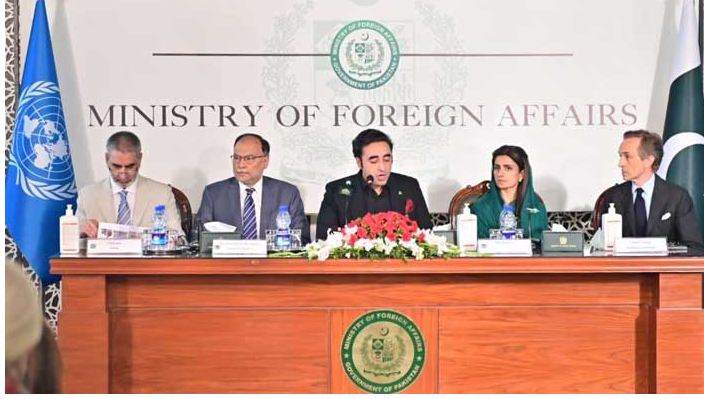The United Nations (UN) on Tuesday jointly launched a flash appeal for $160 million to help Pakistan cope with the flood devastation that has inflicted a $10bn loss on the country’s economy and claimed more than 1,100 lives so far.
Pakistan and the UN have simultaneously launched the “2022 Pakistan Floods Response Plan” in Islamabad and Geneva today. The FRP will complement the government’s overall humanitarian response to the recent floods caused by unprecedented rains.
In a video message for the launch of the appeal, UN Secretary General Antonio Guterres said, “Pakistan is awash in suffering.”
He maintained that the people in Pakistan were facing a monsoon on steroids — the relentless impact of epochal levels of rain and flooding.
In his keynote address at the launch of the event in Islamabad, Foreign Minister Bilawal Bhutto Zardari said, “We are in the midst of the climate catastrophe of the decade, one that has ravaged the entire country in a humanitarian disaster of unimaginable scale and magnitude.
He maintained that heart-wrenching scenes of loss, damage and despair have defined this super-flood as a climate calamity, through which we strive even today to reach our fellow citizens to provide crucial rescue and relief assistance.
$10 billion needed for rehabilitation
Aid efforts have ramped up across Pakistan to help tens of millions of people affected by relentless monsoon rains that have submerged a third of the country and claimed more than 1,100 lives.
The rains that began in June have unleashed the worst flooding in more than a decade, washing away swathes of vital crops and damaging or destroying more than a million homes.
Authorities and charities are struggling to accelerate aid delivery to more than 33 million people affected, a challenging task in areas cut off because roads and bridges have been washed away.
In the south and west, dry land is limited, with displaced people crammed onto elevated highways and railroad tracks to escape the flooded plains.
“We don’t even have space to cook food. We need help,” Rimsha Bibi, a schoolgirl in Dera Ghazi Khan in central Pakistan, told AFP.
Pakistan receives heavy — often destructive — rains during its annual monsoon season, which are crucial for agriculture and water supplies.
But such intense downpours have not been seen for three decades.
Pakistani officials have blamed climate change, which is increasing the frequency and intensity of extreme weather around the world.

